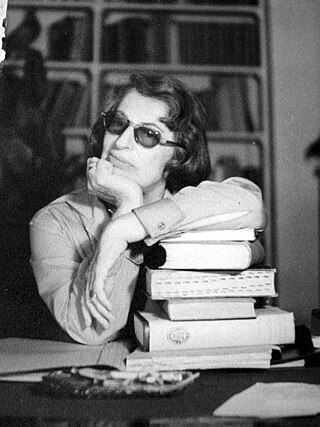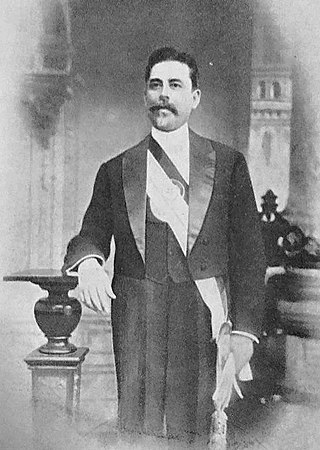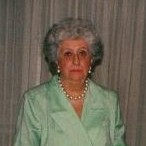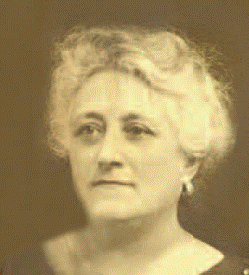Related Research Articles

The University of Buenos Aires is a public research university in Buenos Aires, Argentina. It was established in 1821. It has educated 17 Argentine presidents, produced four of the country's five Nobel Prize laureates, and is responsible for approximately 40% of the country's research output.

Silvina Ocampo was an Argentine short story writer, poet, and artist. Ocampo's friend and collaborator Jorge Luis Borges called Ocampo "one of the greatest poets in the Spanish language, whether on this side of the ocean or on the other." Her first book was Viaje olvidado (1937), translated as Forgotten Journey (2019), and her final piece was Las repeticiones, published posthumously in 2006.

Benigno Asunción Ferreira was President of Paraguay November 25, 1906 – July 4, 1908. He was a member of the Liberal Party.

Virginia Bolten (1870–1960) was a German Argentine journalist and anarchist feminist activist. An anarchist agitator from an early age, she became a leading figure among the working women of Rosario, organising for the Argentine Regional Workers' Federation (FORA) and leading the first women's strike in the country's history. After being recruited into the anarchist movement in Buenos Aires by the Italian anarchist Pietro Gori, she joined some of the country's first anarchist women's organisations and established one of the world's first anarchist feminist periodicals: La Voz de la Mujer.

Herminia Catalina Brumana was an Argentine teacher, writer, journalist, playwright and feminist activist with socialist and anarchist ideas. She wrote nine books and eleven plays, three of them published. She wrote for Mundo Argentino, El Hogar and La Nación, among other periodicals. She actively participated as an anarchist and socialist. She was considered a disciple of Rafael Barrett.
Feminism in Argentina is a set of movements aimed at defining, establishing, and defending equal political, economic, and social rights and equal opportunities for women in Argentina. Although some women have been considered precursors—among them Juana Manso and Juana Manuela Gorriti—feminism was introduced to the country as a result of the great European immigration wave that took place in the late 19th and early 20th century. The first feminists did not form a unified movement, but included anarchist and socialist activists, who incorporated women's issues into their revolutionary program, and prestigious freethinker women, who initially fought for access to higher education and, later, legal equality with men. The early 20th century was also full of women fighting for their freedom and rights in the workplace. Despite the efforts of the first-wave feminists, Argentine women did not acquire the right to vote until 1947, during Juan Perón's first government. His highly popular wife, Eva, championed women's suffrage and founded and ran the nation's first large-scale female political party, the Female Peronist Party. Although she refused to identify herself as a feminist, Eva Perón is valued for having redefined the role of women in politics.
María Teresa Ferrari was an Argentine educator, physician, and women's rights activist. She was the first female university professor in Latin America and one of the first women allowed to teach medicine. She was a pioneering researcher in women's health, studying the use of radiation therapy rather than surgery for uterine tumors and developing a vaginoscope that revolutionized women's health care in Brazil. She established the first maternity ward and gynecological services at the Hospital Militar Central of Buenos Aires in 1925, which provided the first incubation services in the country.

Romina Del Plá is an activist in the Workers' Party (Argentina).

Dora Beatriz Barrancos is an Argentine researcher, sociologist, historian, feminist, and politician.

Nathalia Inés González Seligra is an Argentine teacher and politician who was a National Deputy from 2017 to 2019 for the Socialist Workers' Party (PTS).

Silvia Gabriela Lospennato is an Argentine political scientist and politician, currently serving as National Deputy elected in Buenos Aires Province since 2015. She is a member of Republican Proposal (PRO).

Salvadora Medina Onrubia was an Argentine storyteller, poet, anarchist and feminist.
Ramona Medina was an Argentine feminist activist from the village group La Poderosa of Villa 31, located in Buenos Aires, Argentina. She lived in very precarious conditions with her family, in one of the most important agglomerations of the capital city. In May 2020, she died of COVID-19 after a short hospitalization at the Hospital Muñiz in Buenos Aires.

María Hortensia Lacau was an Argentine pedagogue, writer, essayist, poet, and teacher. Dedicated to teaching and pedagogy, she was a teacher at the secondary, tertiary and university levels. She taught at Colegio Nacional de Buenos Aires and Escuela Superior de Comercio Carlos Pellegrini among other institutions. Lacau gave the chaired "Commentary on Texts" in the entrance courses of the Faculty of Philosophy and Letters of the University of Buenos Aires. She is the co-author of the "Lacau-Rosetti" Spanish Manuals with which several generations of Argentines studied Spanish and literature. She was a recipient of the Konex Award and the Illustrious Citizen of Buenos Aires award.
Marysa Navarro Aranguren is a Spanish-American historian specializing in the history of feminism, the history of Latin American women, and the history of Latin America. She occupies a prominent role as a promoter and activist in the areas of women's studies and women's history. Navarro is an expert on the figure of Eva Perón, having published her biography, and having written articles about her. Navarro lives in the United States, and has dual citizenship, Spanish and U.S.

Raquel Cecilia Kismer de Olmos, better known as Kelly Olmos, is an Argentine economist and politician currently serving as the country's Minister of Labour, Employment and Social Security since 10 October 2022, in the cabinet of President Alberto Fernández.

Sara Justo was an Argentine women's rights activist, educator and dentist. She was a leader in the women's rights movement of Argentina early in the 20th century, supporting women's suffrage and co-founding both the Women's Pro-Suffrage Committee and the Feminist Center of Argentina. She was one of the first four women dentists in Argentina, graduating from the University of Buenos Aires in 1901.

Ana Amado was an Argentine journalist, filmmaker, academic and feminist. In Mexico while in exile, she produced films under the name Cristina Benítez. Amado grew up in rural Argentina and, after training to be a teacher, earned a degree in political science from the Catholic University of Santiago del Estero. During her schooling, she began to work as a television news producer and print journalist. Orphaned when she was young, she moved to Buenos Aires after her graduation and worked for several different television news stations. Traveling abroad with her job, she interviewed subjects like Fidel Castro and Muammar Gaddafi. Because of her support for the leftist Montoneros radicals, she became a target of the Triple A terrorist squads in 1974. Her boyfriend Nicolás Casullo was also targeted, causing the couple to marry and go into exile.

Ramona Modesta Onetto Galarza, most often known as Ramona Galarza, was an Argentine folk singer. She was a popular singer of chamamé and recorded over 30 albums during her career. Born in Corrientes, she later moved to Buenos Aires and became known as La Novia del Paraná. She also appeared in a number of films and was honored by the Argentine Senate.
Emma Victoria Pérez Ferreira was an Argentine physicist who contributed immensely to the advancement of science in Argentina. She was the first female president of the country's National Atomic Energy Commission (CNEA).
References
- 1 2 Centeno, Isolina (2020-09-25). Valinotti, Ana Barreto (ed.). "Ramona Ferreira". Kuña Roga (in Spanish). Retrieved 2023-03-13.
- 1 2 Gasperin, Luiz Eduardo Rodrigues (2021-12-16). "A perspectiva do feminino no teatro paraguaio: Aháta Aju – Capítulo Paraguay". Pitágoras 500 (in Spanish). 11 (2): 133. doi: 10.20396/pita.v11i2.8667113 . ISSN 2237-387X.
- 1 2 3 4 "Ramona Ferreira: la primera mujer periodista y directora de un periódico en Paraguay". Centro de Documentación y Estudios (in Spanish). Archived from the original on 2018-10-15. Retrieved 2023-03-13.
- ↑ Suriano, Juan (2010-08-17). Paradoxes of Utopia: Anarchist Culture and Politics in Buenos Aires, 1890-1910. Translated by Morse, Chuck. AK Press. pp. 159–160. ISBN 978-1-84935-044-0.